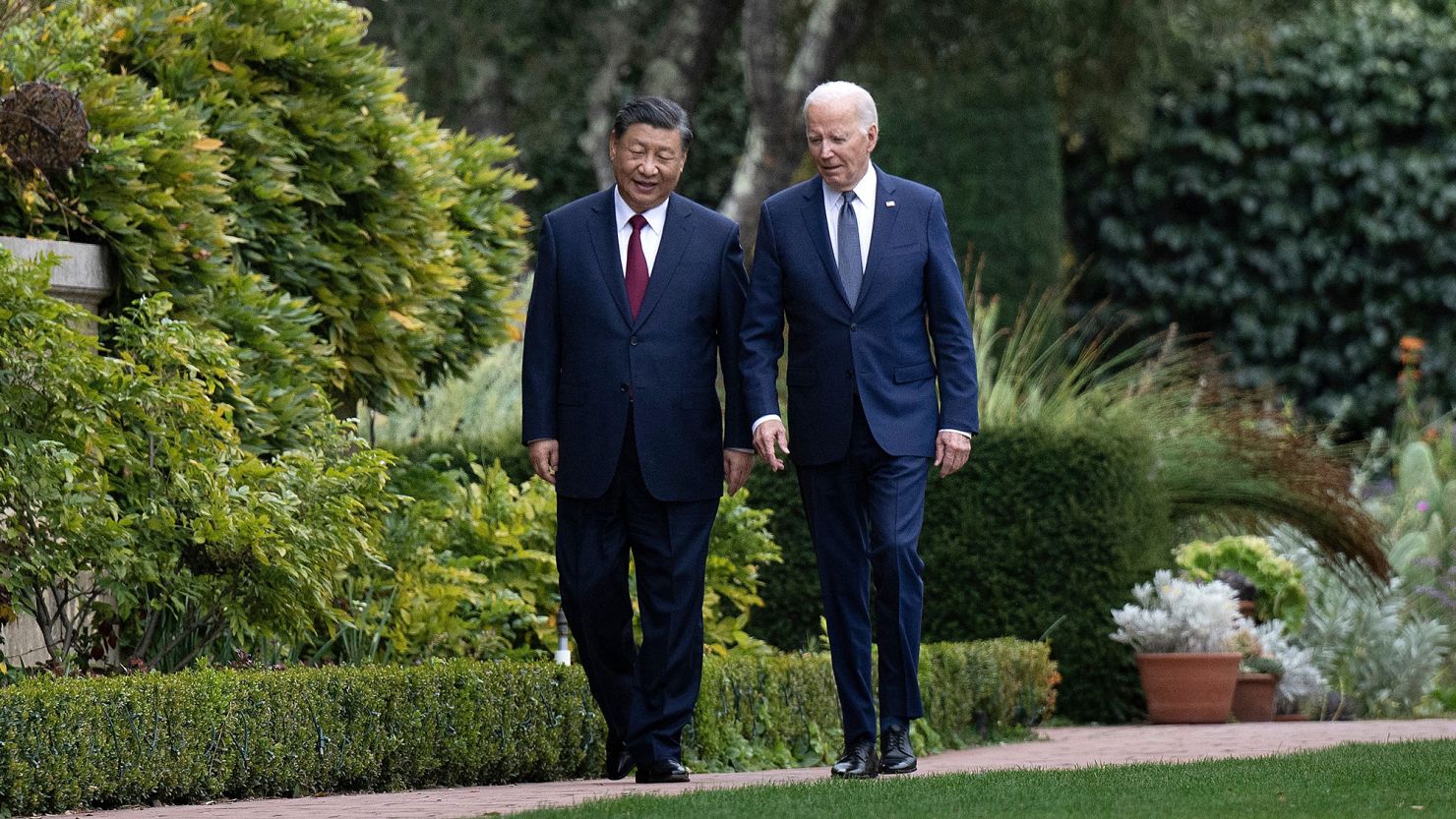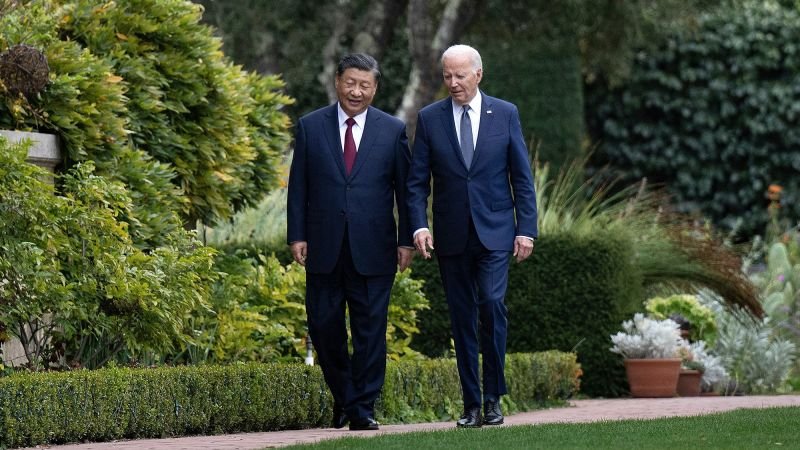
Lima, Peru CNN —
When President Joe Biden meets for the final time Saturday with his Chinese counterpart Xi Jinping, his aides say the moment will be ripe for reflection on a relationship that began more than a decade ago, over a long meal in Chengdu.
It was an episode that left deep impressions on the president, at least judging by how often he recounts it. A search of Biden’s speeches over the past four years finds 61 instances of him describing a moment at the end of the evening when, asked by Xi to define America, he came up with a single word: Possibilities.
In the end, looking backward may be more productive for Biden and Xi than trying to predict what’s next for their two nations.
Donald Trump’s return to the White House has been the overwhelming backdrop to the summit of Pacific leaders that’s been unfolding in Lima this week, as delegates discuss and strategize for an uncertain future.
Trump’s embrace of tariffs, autocrats and isolationist viewpoints runs mostly counter to the foreign policy principles Biden spent the past four years espousing on the world stage.
Yet perhaps most disconcerting for leaders gathered in Lima may be Trump’s unpredictability. That includes Xi, who regularly encourages stability above all else in his public pronouncements.
In prepared remarks delivered to the APEC summit a day ahead of his meeting with Biden, Xi said the world had “entered a new period of turbulence and transformation,” state news agency Xinhua reported, warning of “spreading unilateralism and protectionism.”
Still scarred from a chaotic first administration and looking for clues of whether Trump will adopt a more level approach during his second go-around, world leaders have not been encouraged by the Cabinet selections emerging from Mar-a-Lago. Talk of Robert F. Kennedy, Jr., Tulsi Gabbard, Pete Hegseth and former Rep. Matt Gaetz has permeated even the back hallways of the Lima Convention Center, where the APEC summit is convening.
Trump is hardly a mystery to Xi and his Chinese advisers, who spent four years dealing with him before Biden entered office. But like most of Trump’s policy choices, how he chooses to approach the world’s most consequential bilateral relationship this time around is anyone’s guess.
There are signs pointing toward a more aggressive stance, including his hawkish choices for top national security roles. He’s promised vast 60% tariffs on Chinese imports, a move that would inject new volatility into an already contentious relationship.
But there’s also the memory of his attempts at cultivating Xi during his first administration, hoping to secure trade agreements and improve other areas of cooperation. Ultimately, Trump and Xi inked a trade deal in which China agreed, among other things, to purchase hundreds of billions of dollars in American goods, which it never ended up buying.
The trade disputes, along with Xi’s attempts at obscuring the origins of the coronavirus, eventually soured ties between the two men. How Trump proceeds this time around could have wide implications for the region and world.
Those stakes aside, there is little Biden can say to Xi that might reassure him of smooth Washington-Beijing ties in the years ahead. Biden administration officials acknowledge they have little insight into what a notoriously unpredictable leader might be planning.
What Biden can do, they argue, is reiterate to Xi the value of maintaining communication, even amid the expected contention.
“Transitions are uniquely consequential moments in geopolitics. They’re a time when competitors and adversaries can see possible opportunity,” Biden’s national security adviser Jake Sullivan said as the president was headed to Peru. “And so, part of what President Biden will communicate is that we need to maintain stability, clarity, predictability through this transition between the United States and China.”
Unlike their previous two meetings – on the sidelines of a G20 summit in Bali and at an estate outside San Francisco – the Lima talks aren’t expected to result in a major list of outcomes. The men will talk about the usual topics – including Taiwan, Ukraine, fentanyl production and human rights – along with some new irritants, namely China’s alleged efforts to hack Trump’s cellphone along with other devices associated with his campaign.
But mostly it will be an opportunity to look back on what has been a lengthy and somewhat complicated relationship.
The two men came to know each other when each was serving as vice president. When it became clear Xi — then something of a mystery to American officials — was poised to take over leadership in China, Biden was dispatched by the Obama administration to take his temperature.
Biden likes to brag that he’s traveled tens of thousands of miles with Xi, and that among his fellow world leaders he’s spent the most time with him. And while that may have been true at one point, Xi has clearly turned his attentions to deepening his relationship with another leader: Russia’s Vladimir Putin.
The “no limits” partnership the two men declared earlier in Biden’s term has concerned US, European and Asian officials alike, who see a growing anti-West partnership between China, Russia, Iran and North Korea as one of the biggest future security threats. Already, the US has assessed China is sending tools and technology to Russia to produce missiles, aircraft and tanks used in its war against Ukraine. And revelations that Pyongyang has sent troops to Russia for fighting in Ukraine have loomed over talks in Peru this week.
How Trump confronts those threats is not something he’s discussed at great length, at least as a candidate.
Speaking Friday, Biden acknowledged the world faces “a moment of significant political change” as he hailed a strengthened three-way partnership between the United States, Japan and South Korea.
Biden’s efforts to bring Tokyo and Seoul into closer partnership after years of historical acrimony amount to a major facet of his legacy in East Asia and his attempt to create counterweight to China.
It’s also an area his aides believe could — and should — be continued by the incoming Trump administration, though acknowledging they have little to go on when it comes to the president-elect’s intentions.
Biden conceded Friday the meeting between himself, South Korea’s Yoon Suk Yeol and Japan’s new Prime Minister Shigeru Ishiba was likely to be his last such encounter before he steps aside in January.
But he said his efforts to bring the three nations closer — after years of historical acrimony and tensions — would endure.
“I think it’s built to last,” he said. “It’s my hope and expectation.”
